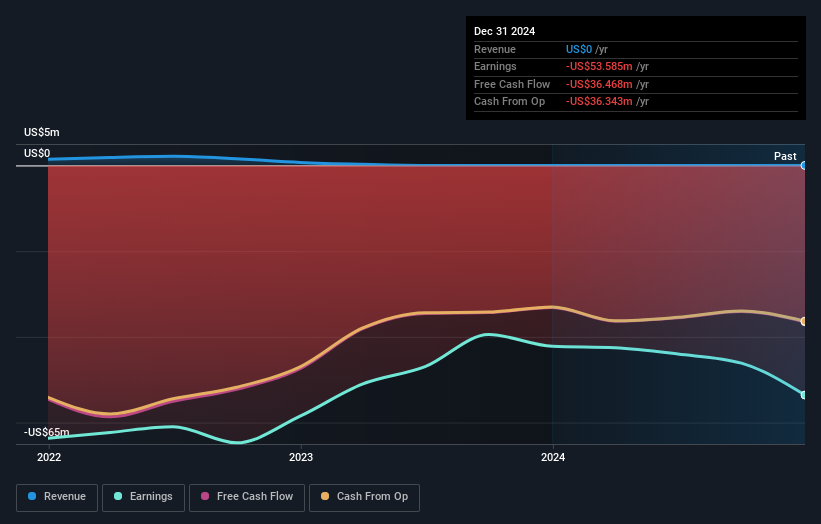- United States
- /
- Medical Equipment
- /
- NasdaqCM:PLSE
After the recent decline, Pulse Biosciences, Inc. (NASDAQ:PLSE) Top Key Executive Robert Duggan's holdings have lost 4.2% of their value

Key Insights
- Significant insider control over Pulse Biosciences implies vested interests in company growth
- Robert Duggan owns 71% of the company
- Using data from company's past performance alongside ownership research, one can better assess the future performance of a company
If you want to know who really controls Pulse Biosciences, Inc. (NASDAQ:PLSE), then you'll have to look at the makeup of its share registry. The group holding the most number of shares in the company, around 73% to be precise, is individual insiders. That is, the group stands to benefit the most if the stock rises (or lose the most if there is a downturn).
As a result, insiders as a group endured the highest losses after market cap fell by US$51m.
In the chart below, we zoom in on the different ownership groups of Pulse Biosciences.
View our latest analysis for Pulse Biosciences

What Does The Institutional Ownership Tell Us About Pulse Biosciences?
Many institutions measure their performance against an index that approximates the local market. So they usually pay more attention to companies that are included in major indices.
We can see that Pulse Biosciences does have institutional investors; and they hold a good portion of the company's stock. This suggests some credibility amongst professional investors. But we can't rely on that fact alone since institutions make bad investments sometimes, just like everyone does. When multiple institutions own a stock, there's always a risk that they are in a 'crowded trade'. When such a trade goes wrong, multiple parties may compete to sell stock fast. This risk is higher in a company without a history of growth. You can see Pulse Biosciences' historic earnings and revenue below, but keep in mind there's always more to the story.

Pulse Biosciences is not owned by hedge funds. Our data suggests that Robert Duggan, who is also the company's Top Key Executive, holds the most number of shares at 71%. When an insider holds a sizeable amount of a company's stock, investors consider it as a positive sign because it suggests that insiders are willing to have their wealth tied up in the future of the company. In comparison, the second and third largest shareholders hold about 2.0% and 1.7% of the stock.
Researching institutional ownership is a good way to gauge and filter a stock's expected performance. The same can be achieved by studying analyst sentiments. We're not picking up on any analyst coverage of the stock at the moment, so the company is unlikely to be widely held.
Insider Ownership Of Pulse Biosciences
The definition of company insiders can be subjective and does vary between jurisdictions. Our data reflects individual insiders, capturing board members at the very least. Company management run the business, but the CEO will answer to the board, even if he or she is a member of it.
Insider ownership is positive when it signals leadership are thinking like the true owners of the company. However, high insider ownership can also give immense power to a small group within the company. This can be negative in some circumstances.
It seems that insiders own more than half the Pulse Biosciences, Inc. stock. This gives them a lot of power. Insiders own US$846m worth of shares in the US$1.2b company. That's extraordinary! Most would be pleased to see the board is investing alongside them. You may wish to discover if they have been buying or selling.
General Public Ownership
The general public, who are usually individual investors, hold a 17% stake in Pulse Biosciences. While this group can't necessarily call the shots, it can certainly have a real influence on how the company is run.
Next Steps:
While it is well worth considering the different groups that own a company, there are other factors that are even more important. For instance, we've identified 2 warning signs for Pulse Biosciences (1 shouldn't be ignored) that you should be aware of.
If you would prefer check out another company -- one with potentially superior financials -- then do not miss this free list of interesting companies, backed by strong financial data.
NB: Figures in this article are calculated using data from the last twelve months, which refer to the 12-month period ending on the last date of the month the financial statement is dated. This may not be consistent with full year annual report figures.
New: Manage All Your Stock Portfolios in One Place
We've created the ultimate portfolio companion for stock investors, and it's free.
• Connect an unlimited number of Portfolios and see your total in one currency
• Be alerted to new Warning Signs or Risks via email or mobile
• Track the Fair Value of your stocks
Have feedback on this article? Concerned about the content? Get in touch with us directly. Alternatively, email editorial-team (at) simplywallst.com.
This article by Simply Wall St is general in nature. We provide commentary based on historical data and analyst forecasts only using an unbiased methodology and our articles are not intended to be financial advice. It does not constitute a recommendation to buy or sell any stock, and does not take account of your objectives, or your financial situation. We aim to bring you long-term focused analysis driven by fundamental data. Note that our analysis may not factor in the latest price-sensitive company announcements or qualitative material. Simply Wall St has no position in any stocks mentioned.
About NasdaqCM:PLSE
Flawless balance sheet very low.
Market Insights
Community Narratives



